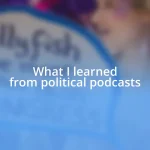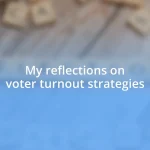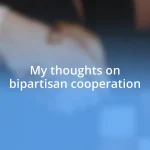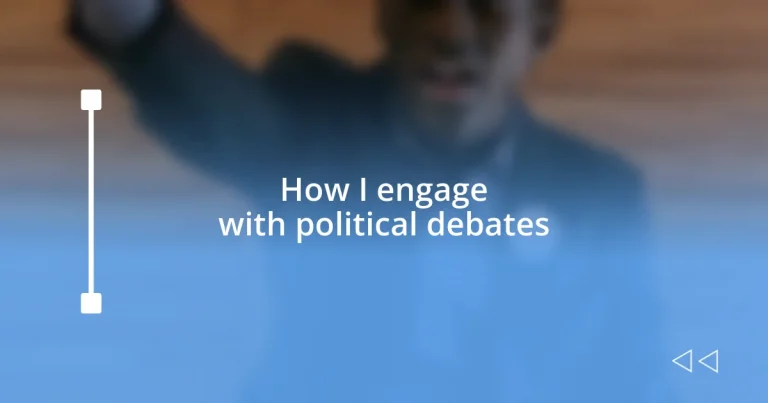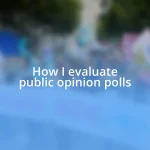Key takeaways:
- Understanding the emotional and authentic connection during debates enhances meaningful discussions beyond mere performances.
- Preparing effectively through anticipating viewpoints, researching current events, and practicing can greatly improve confidence and performance in debates.
- Engaging with opposing viewpoints and reflecting on personal experiences fosters empathy and growth, transforming disputes into opportunities for connection and understanding.
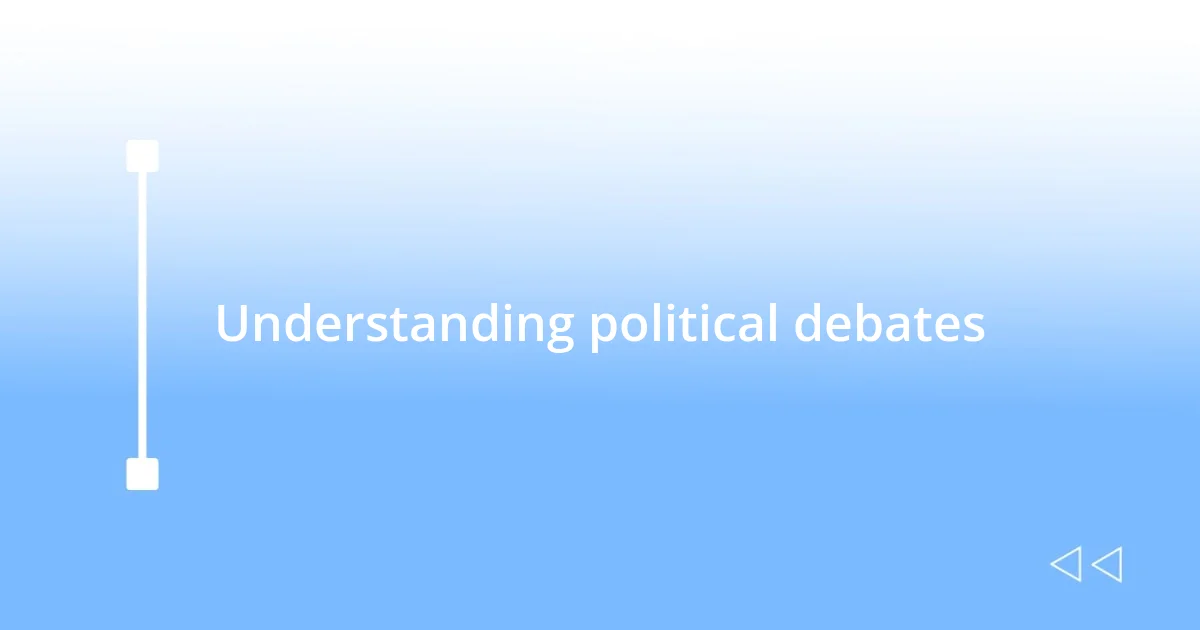
Understanding political debates
Political debates can often feel like a battleground, where passionate voices clash over differing beliefs. I remember watching a particularly heated debate where candidates seemed more focused on attacking each other than discussing their policies. It left me wondering: are we truly listening to one another, or are we just waiting for our turn to speak?
Understanding political debates goes beyond just the words spoken; it’s about grasping the underlying values and emotions that fuel those discussions. For instance, I’ve noticed that when a candidate shares a personal story, it resonates deeply with viewers. It’s almost as if those experiences bring a human touch to the complex issues at hand, bridging the gap between the speakers and the audience.
I find myself often pondering why some debates feel more genuine than others. Is it the charisma of the debaters, their ability to connect through shared experiences, or the underlying authenticity of their messages? From my experience, when participants engage with empathy and honesty, the debates transform from mere performances into meaningful conversations that can inspire real change.
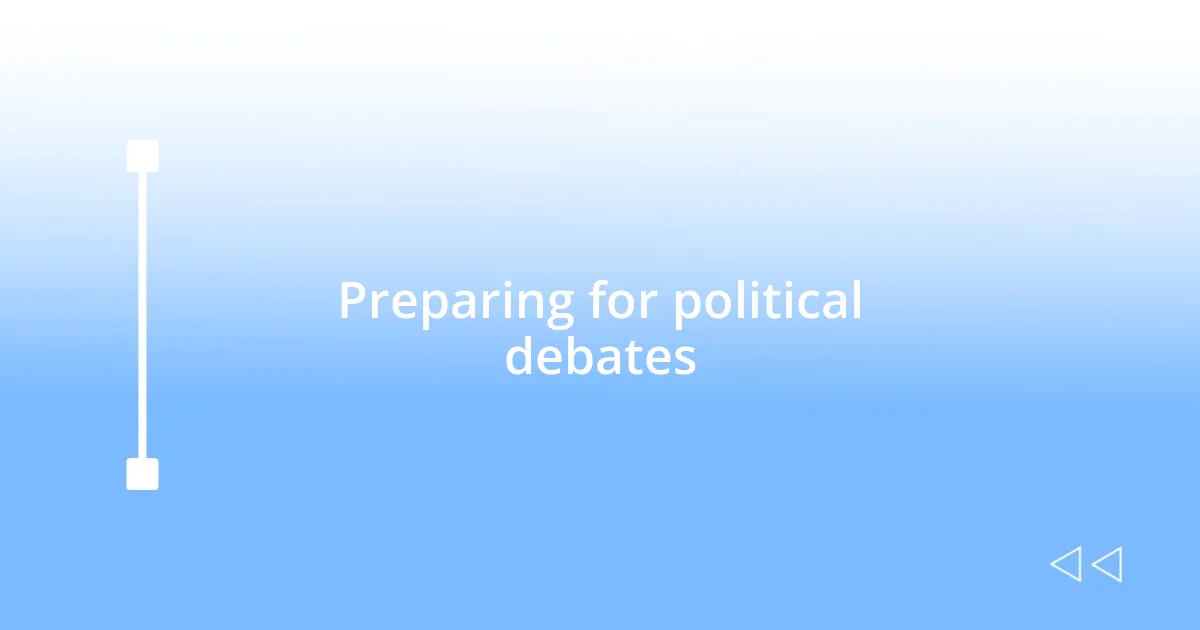
Preparing for political debates
Preparing for political debates requires a thoughtful approach that goes beyond just memorizing facts. I’ve learned that it’s essential to anticipate various viewpoints and prepare to address them actively. For example, I once focused on a specific issue during a debate prep session, brainstorming potential counterarguments and responses. It really helped me feel more confident during the actual debate.
Another vital aspect is researching the current context. Understanding recent developments related to the topics at hand can provide a significant edge. I recall a time when I overlooked a crucial news story, and it left me feeling underprepared when it came up during the discussion. It’s moments like these that remind me of the importance of staying informed and how current events can shape the debate landscape.
Lastly, practice cannot be overstated enough. Rehearsing with others can simulate real-time pressure and help refine your messaging. I remember organizing a mock debate with friends—though it was a little nerve-wracking, that experience fine-tuned my ability to deliver clear and concise arguments under pressure. These steps have always proven invaluable to me, ensuring that I engage effectively during debates.
| Preparation Step | Description |
|---|---|
| Anticipating Viewpoints | Think about opposing arguments to improve your responses. |
| Researching Current Events | Stay updated on recent developments to enhance your context. |
| Practicing | Simulate debates to refine your speaking and argumentation skills. |
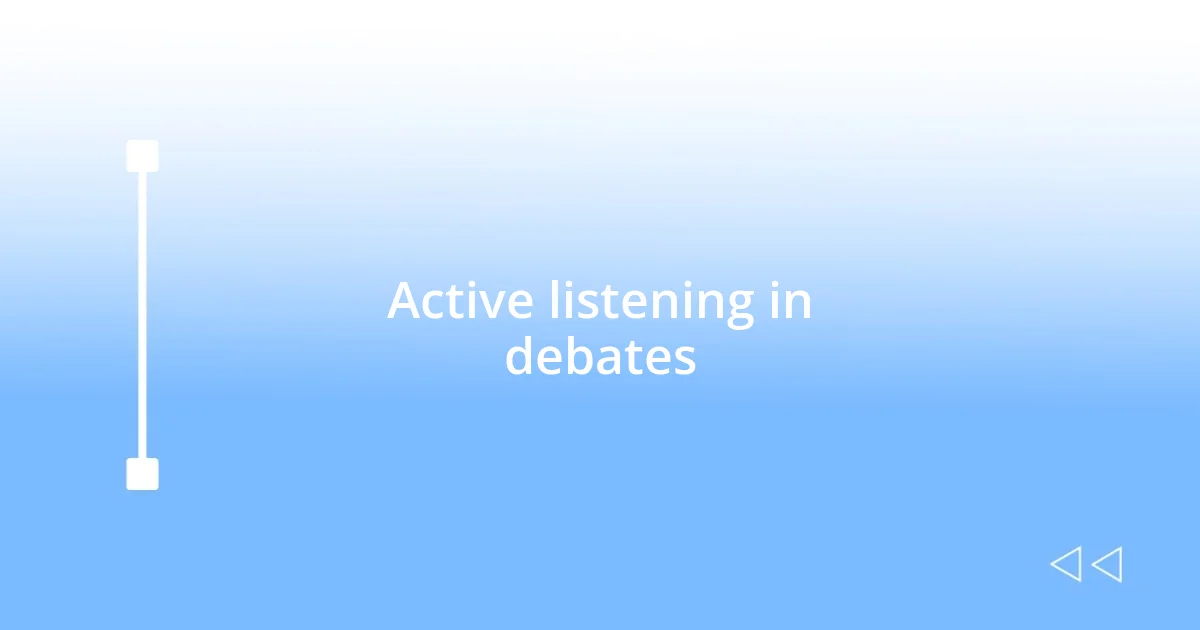
Active listening in debates
Active listening is an essential component of engaging in political debates. I recall a past debate where one participant actively listened, absorbing not just the words but the emotions behind them. This approach led to a surprising moment of connection, demonstrating that when we listen attentively, we can find common ground even amidst disagreement.
Here are some key aspects of active listening in debates:
- Focus on the Speaker: Dedicating your full attention helps to truly understand their perspective.
- Acknowledge Emotions: Recognizing the feelings behind statements can diffuse tension, making discussions more constructive.
- Ask Clarifying Questions: This not only shows that you’re engaged but also helps to ensure you grasp the nuances of the argument.
- Reflect What You Hear: Paraphrasing or summarizing can demonstrate that you value their thoughts, fostering a more respectful dialogue.
I’ve found that when I practice active listening, it not only enriches my engagement but also opens the door to richer, more nuanced discussions. In moments where I’ve genuinely listened, I often walk away feeling like I’ve learned something valuable, regardless of the debate’s outcome.
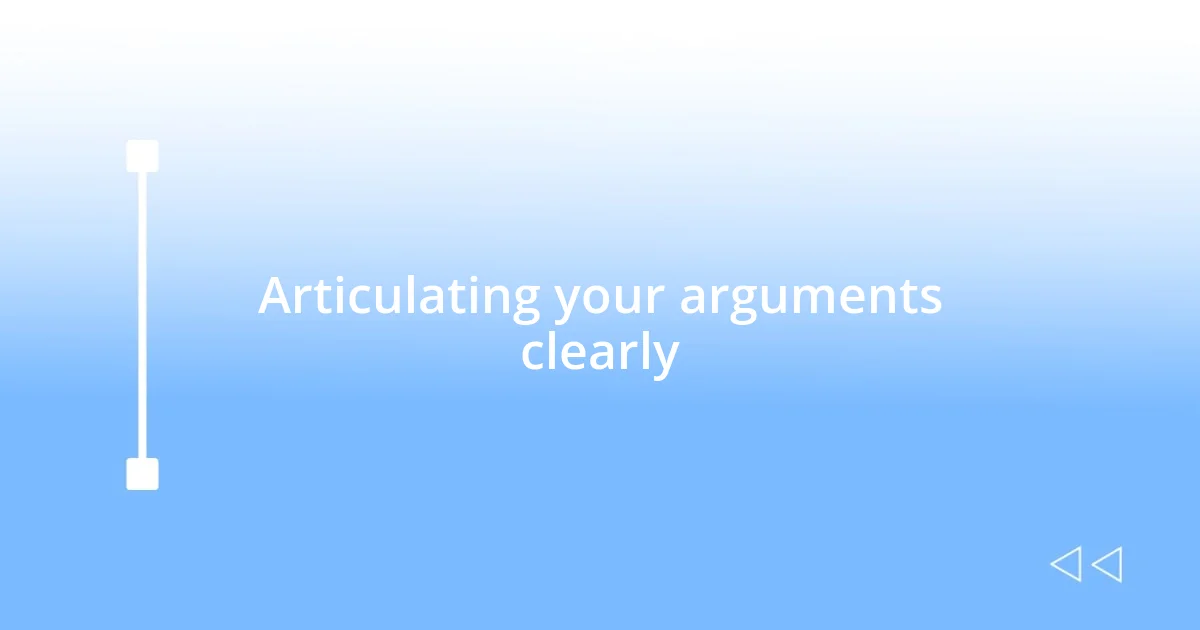
Articulating your arguments clearly
Articulating arguments clearly is crucial in making your point resonate during a debate. I’ve found that using straightforward language helps break down complex issues into digestible pieces. One memorable debate I participated in taught me that jargon can alienate the audience. I started opting for simpler terms, and the difference was striking—people were more engaged, and the conversation flowed more smoothly.
Clarity also comes from structuring my arguments effectively. I often utilize the classic “claim, evidence, reasoning” framework. For instance, when arguing for policy changes, I would first present my claim, back it up with solid evidence, and then explain the reasoning behind it. During a particularly heated debate, I saw how a well-structured argument could cut through the noise and anchor the discussion. When everything is laid out clearly, it allows others to follow my thought process and confront the evidence rather than getting lost in the intricacies of language.
Moreover, incorporating personal experiences into my arguments not only adds authenticity but also helps illustrate my points. I remember sharing a heartfelt story about how a policy directly impacted my community, which opened the floodgates for a more meaningful conversation. It made my argument not just a theoretical discussion, but something people could relate to on an emotional level. Have you ever thought about how stories can transform a debate? They have the power to connect us in ways that facts alone often cannot.
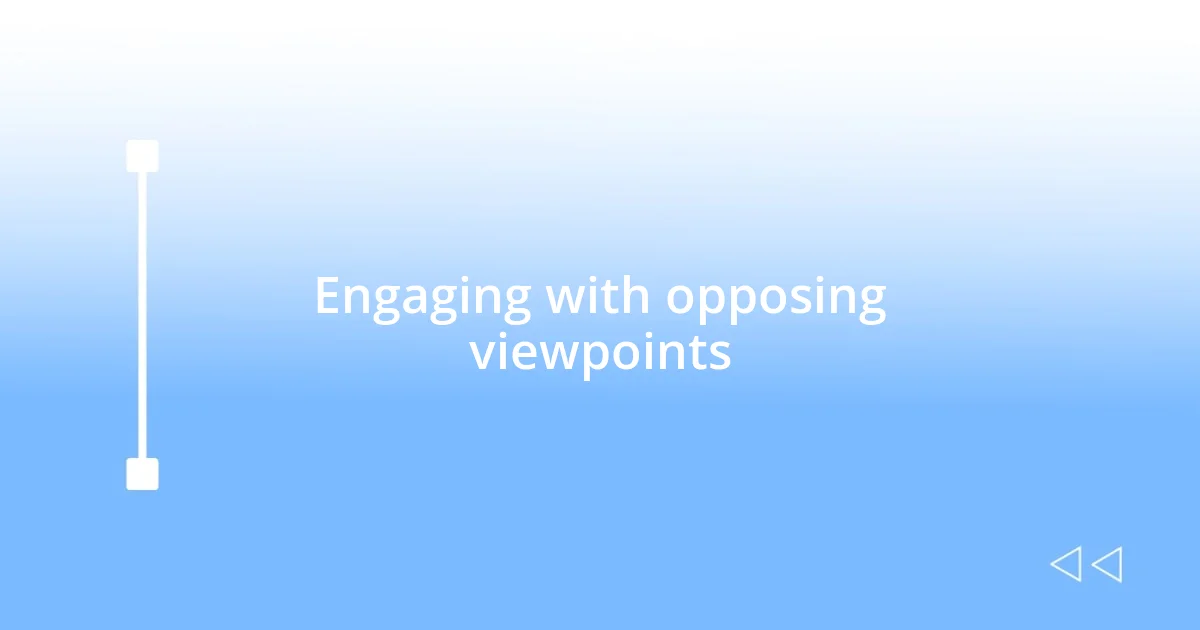
Engaging with opposing viewpoints
Engaging with opposing viewpoints can feel daunting, but I’ve found it to be one of the most rewarding aspects of debate. One time, during a discussion about climate change, I really tried to empathize with a participant who held a contrary view. Instead of dismissing their perspective, I asked them what personal experiences shaped their beliefs. Their response revealed a deep-seated fear of economic hardship, which opened my eyes to the complexity of their stance. This moment illustrated how understanding someone’s background can create more meaningful dialogues.
When addressing opposing viewpoints, I often reflect on how my own beliefs were once challenged and reshaped. I remember sitting with friends who were staunchly against a policy I supported, and rather than arguing, I invited them to share their reasoning. Listening to their concerns helped me refine my arguments and consider aspects I hadn’t before. This exchange wasn’t just about winning a debate; it turned into a space for growth and understanding. Have you ever had your viewpoint transformed by simply listening? I certainly have.
I’ve realized that acknowledging the validity of opposing views doesn’t mean abandoning my principles; it actually strengthens my arguments. During one heated political forum, I made it a point to openly agree with a few of my opponent’s observations, which surprisingly led to a more productive conversation. By recognizing some truth in their perspective, I felt a shift in the atmosphere; it became less combative and more collaborative. This approach taught me that engaging with others doesn’t have to be about victory; it can also be about connection, understanding, and even finding common ground in our differences.
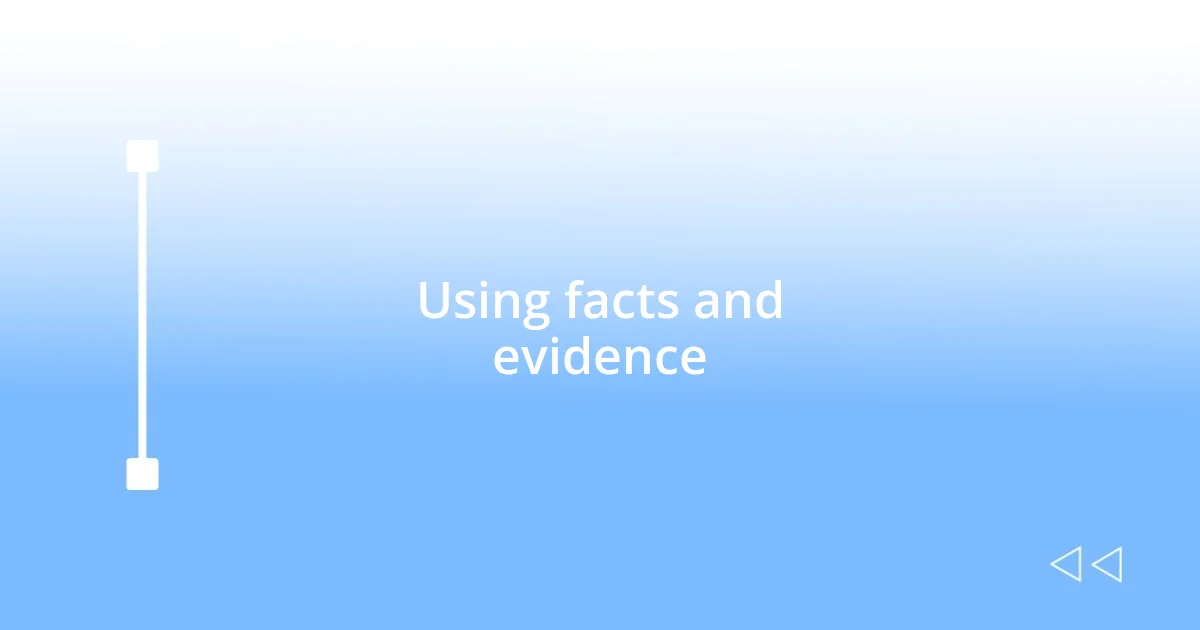
Using facts and evidence
Using facts to support my arguments is essential for maintaining credibility during political debates. I recall an instance when I cited recent studies about education reform. It not only solidified my stance but also caught the attention of skeptics in the room. They seemed to appreciate the evidence, and it sparked a more fact-based discussion rather than just opinions flying back and forth.
I’ve learned that weaving evidence into my conversations can transform the dynamics of a debate. For example, in a recent debate about healthcare policies, I shared statistics that illustrated the impact of universal coverage in other countries. The data struck a chord with many participants, prompting them to reconsider their preconceived notions. Have you ever noticed how numbers and data can shift the atmosphere from tension to curiosity? It’s almost magical how well-researched facts can create openings for deeper conversations.
The choice of sources is just as important as the facts themselves. I’ve made it a point to use reputable studies and surveys, which I feel adds weight to my arguments. During a lively discussion on climate policy, I quoted a report from a respected environmental organization. This not only reinforced my position but also built trust among the audience. When we engage with solid evidence, we invite others to join the dialogue rather than retreat in defensiveness. That pivotal trust can truly shift the nature of any debate.
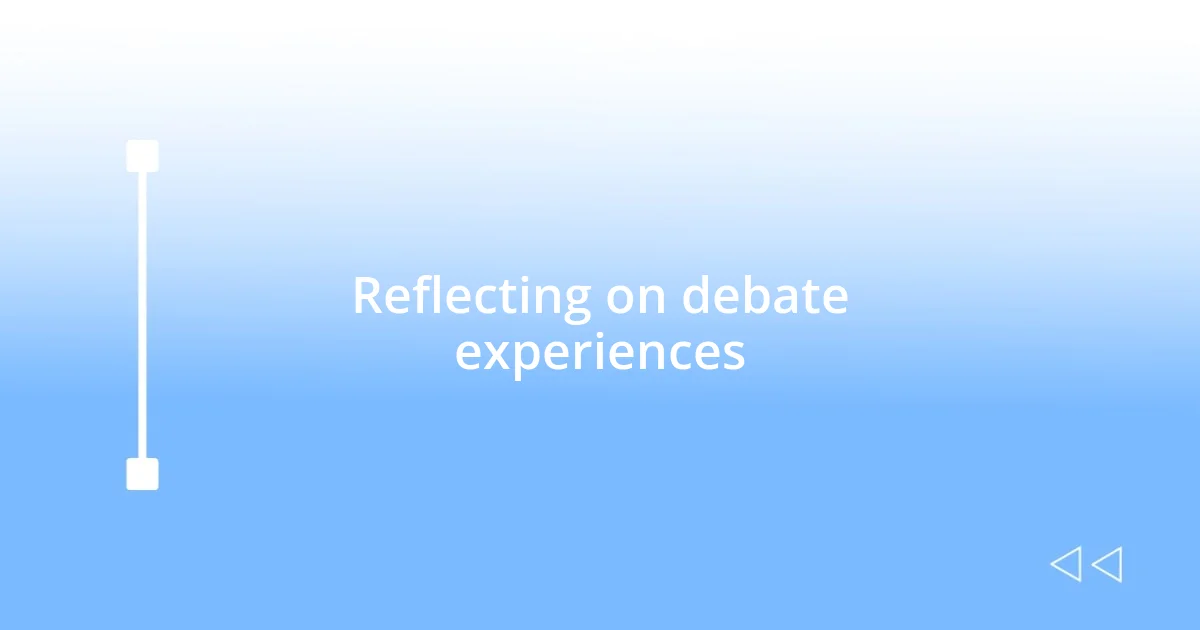
Reflecting on debate experiences
Reflecting on my debate experiences always prompts me to think about the moments that truly shaped my perspective. For instance, I recall a heated exchange during a university debate where my stance on immigration reform was met with severe opposition. Instead of feeling overwhelmed, I took a step back and asked myself what underlying fears were driving the arguments against my position. This introspection not only helped me empathize with the other side but also clarified my own beliefs, reminding me that everyone has a story that informs their viewpoint.
There was a time when I engaged in a community debate about local law enforcement. I noticed that one participant was profoundly passionate and emotional about their experiences. It hit me—a real connection forms when we shed our arguments and instead focus on what drives them. I realized that acknowledging someone’s story, even if I disagreed, builds bridges rather than walls. This moment of connection left a lasting impression on me about the power of dialogue over discord. Have you ever experienced that feeling of understanding someone in a way that transcended your disagreement? It’s enlightening, to say the least.
Sometimes, I catch myself reflecting on how my debate experiences have evolved over time. Early on, I often felt the need to ‘win’ rather than communicate effectively. But now, I cherish the conversations that lead to growth—even when they challenge my beliefs. I remember a debate in which my position was dismantled by a strong counterargument. Instead of feeling defeated, I relished the clarity and depth it brought to my understanding. That’s when it struck me: every debate is a lesson in disguise, and the willingness to learn is what truly enriches our experiences. Doesn’t that shift your perspective on engaging in such conversations?





